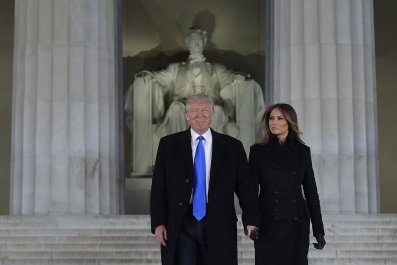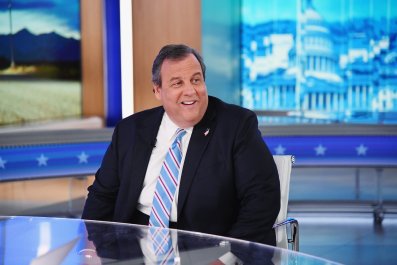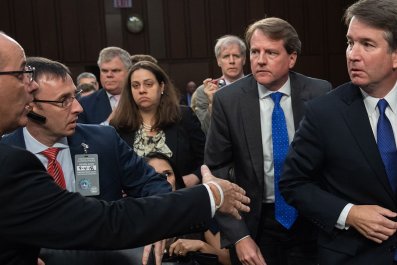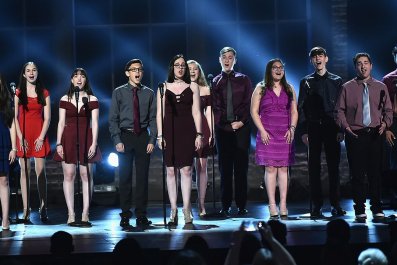In early January, less than a week after Democrats took control of the House, Speaker Nancy Pelosi stood before a podium and made one of her highest priorities clear: gun control.
It was the eighth anniversary of a grim day in modern American history—the shooting that nearly killed then-Representative Gabby Giffords at a constituent event in Arizona. "It's a day of grief," Pelosi said at a crowded press conference in the Capitol, "but also a day of action." She introduced Giffords, who now runs a political action committee dedicated to gun safety, and veteran Representative Mike Thompson of California, the chairman of the House Gun Violence Prevention Task Force. Congress, they say, must pass legislation to expand background checks before gun purchases.
But then Pelosi did something unusual: She turned to acknowledge one of the newest members of the House. Lucy McBath, 58, had never been a politician before. She had worked as a flight attendant and human resources executive for Delta Air Lines in Atlanta for 30 years. But everyone in the room knew why she was there. She had recently marked her own tragic anniversary.
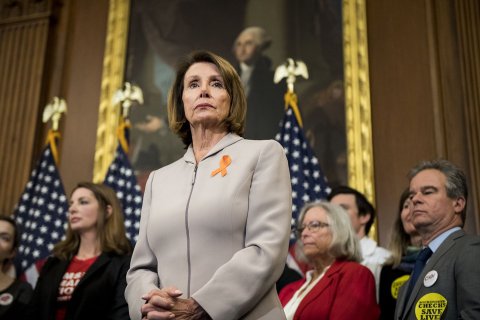
More than six years ago, McBath got the phone call; a police officer on the line said things that no parent should ever hear, but which far too many in the U.S. now do. Her 17-year-old son, Jordan Davis, was dead. He had been riding in a car with friends when they got into a dispute with someone over whether they were playing music too loudly. A trivial, stupid argument over nothing. Davis was shot and died instantly. "Background checks save lives," McBath told the crowd on Capitol Hill. "I ask my fellow parents, my fellow members, and my fellow Americans to stand with us today.… Together, we will make our community safer, and the country deserves it."
Like so many modest gun bills, the expanded background check legislation had been introduced before, only to wither. Democrats had proposed similar measures in 2012, after a mass shooting that killed 20 children and six adults at Sandy Hook Elementary School in Newtown, Connecticut. In 2015, after a shooter killed nine people at Umpqua Community College in Roseburg, Oregon, they offered a tougher version that required law enforcement approval of a permit to buy a gun. It, too, went nowhere. But this time, gun safety advocates believe, is different. McBath's surprising upset last November was Exhibit A. She had run—and won—on gun control in a deep-red district in suburban Atlanta. And she was far from alone.
In the room with her at the press conference was Jennifer Wexton, a Democrat who unseated a National Rifle Association–backed Republican for a seat in northern Virginia, and Kim Schrier, a physician from Washington state who beat another GOP incumbent.
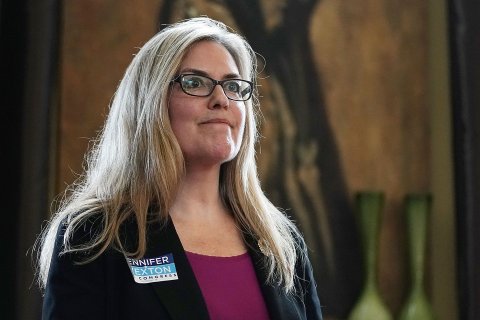
These candidates and others didn't just win in what was a solidly blue year; they ran on gun safety loudly. Wexton's television ads, for example, pummeled her opponent relentlessly as a tool of the NRA. In all, 95 candidates who were supported by Giffords PAC won. Everytown for Gun Safety, the PAC founded by former New York Mayor Michael Bloomberg (a possible 2020 presidential candidate), also played big: the group went head-to-head with the NRA in 43 federal races, and 77 percent of its candidates emerged victorious. For the first time in at least two decades, gun safety advocates outspent the gun lobby, by $2.4 million, according to Shannon Watts, the founder of Moms Demand Action for Gun Sense in America, a gun violence prevention advocacy group.
"The issue resonated with pretty much everyone," Wexton tells Newsweek, "but in particular with independent and moderate Republican women. There was really a palpable sense, after all these instances of mass shootings, that enough was enough. Some common sense stuff had to get done."
McBath, standing beside Wexton, nodded vigorously. "That is what we're here for."
Republicans, of course, still control the Senate, and President Donald Trump, who has called himself "the biggest fan of the Second Amendment," remains skeptical of most new gun laws. But the freshmen are far from naïve. "We're in a long game," McBath says. "And this issue isn't going away."
The Democratic embrace of gun control represents a significant shift in Washington. It has been nearly a generation since then-President Bill Clinton and a Democrat-dominated Congress passed an assault weapons ban, provoking a backlash that helped Republicans retake the House and the Senate in 1994, giving the GOP legislative control for the first time in 40 years. The effect on the Democratic Party, including its attitude toward gun control, was profound. The party effectively dropped guns as an issue. And an increasing number of Democratic representatives, particularly in red states, began getting NRA support.
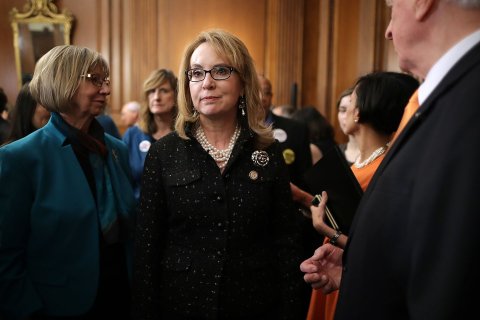
Even in Barack Obama's first term as president, when Democrats controlled one or both houses, nothing got done on gun control. In 2012, after Sandy Hook, Obama, with the passionate support of grieving parents, pushed hard for the expanded background check bill. But in 2013, it died after a filibuster in a Senate still controlled by Democrats. "That alone shows you how much has changed," says Peter Ambler, executive director of Giffords PAC and a veteran Hill staffer. "Everyone [in the Democratic majority] was afraid back then. We thought gun safety was a losing issue. Hell, it had been a losing issue. Now? I don't think so."
For decades, gun rights supporters, led by the NRA, have tenaciously fought against virtually every effort, no matter how small, to rein in gun violence. It's why a bill that seems, to noncombatants in the gun wars, relatively uncontroversial—the expanded background check legislation that House Democrats proposed last month—almost always runs into Republican opposition. In red states in particular, gun owners are passionate and politically organized by the NRA, and any Republican who goes against them risks defeat. To the pro-gun lobby, there is a gun grabber under every bed in Washington, and every piece of gun violence legislation is a step toward the ultimate endgame: a massive, mandatory government buyback of guns from private citizens, much as Australia did in 1996, when over 1 million firearms were collected and destroyed.
This fear underlies the gun lobby's core legislative tack: to fight every skirmish as if everything is at stake—and to seize ground when their supporters are in power. Thus, when Republicans controlled both the White House and Congress during the George W. Bush administration, the NRA pushed through a bill that gave gun manufacturers and dealers immunity from liability litigation, something that had begun to hurt them. Lawsuits in Chicago and Detroit, for example, went after illegal straw purchases—transactions that shielded the identity of the ultimate purchaser of a weapon. Studies on the impact of those suits found that there were significant reductions in the flow of weapons to criminals in those cities.
Now, however, the GOP finds itself on the defensive. Just before last year's midterms, Gallup found that six in 10 Americans support stricter gun laws, among the highest numbers in two decades. Even more—as many as 90 percent—favor universal background checks. The reason for the shift, political analysts and pollsters say, is the shocking regularity of mass shootings in the United States; the routine adoption of things like "lockdown" drills in suburban schools (Wexton says they've come "to disgust a whole lot of parents, both Republicans and Democrats"); and the standard response of those who support gun rights, which is to offer thoughts and prayers to the victims but then shrug and argue that gun possession is enshrined in the Constitution. After a gunman shot and killed 17 people at Marjory Stoneman Douglas High School in Parkland, Florida, last year, satirical news site The Onion nailed the dynamic: "'No Way to Prevent This,' Says Only Nation Where This Regularly Happens." Now, that sarcasm may be misplaced. Last spring, millions of people across the country turned out to demonstrate for more gun laws in the student-led March for Our Lives protests.
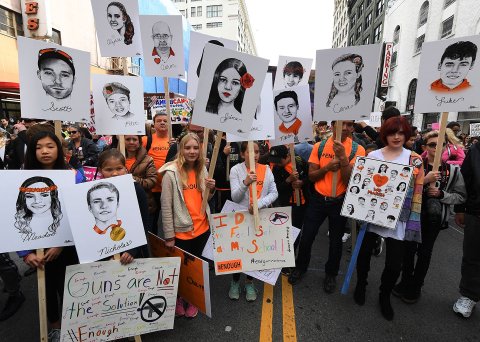
Even Trump noticed. His Justice Department imposed a ban on bump stocks, attachments that allow semi-automatic weapons to fire like fully automatic machine guns. Such a device was used by the shooter who massacred 58 people and wounded hundreds of others at a concert in Las Vegas in 2017. According to The Wall Street Journal, it was the first time in more than half a century that the federal government required any gun-related item to be turned over or destroyed.
The NRA, however, denies the political landscape on guns is changing. Yes, the group acknowledges, its membership dues and contributions have fallen 21 percent. But similar dips have occurred after the elections of other gun-friendly presidents. Likewise, the NRA dismisses the victories of gun control advocates like McBath. "To paint November as a referendum on guns is just wrong," says spokeswoman Dana Loesch. "There were a lot of issues in play." New gun safety measures, she says, are close to pointless. As Loesch puts it, "Nothing that has been proposed would have done anything to prevent any of the mass attacks that have occurred in this country. That's just a fact."
Guns safety advocates reject that assertion. They note, accurately, that existing background check requirements should have prevented the shooting that killed 26 in Sutherland Springs, Texas, in 2017. But the Air Force, where gunman Devin Patrick Kelley had served, failed to report his domestic abuse conviction and involuntary commitment to a mental health center. The bill Democrats introduced last month includes financial penalties to enhance reporting compliance for employers, among other measures. Gun control advocates note that the FBI asked the Bureau of Alcohol, Tobacco, Firearms and Explosives in December 2017 to retrieve more than 4,000 guns purchased by people who should not have passed background checks. "Strengthening the system is a no-brainer," says McBath.
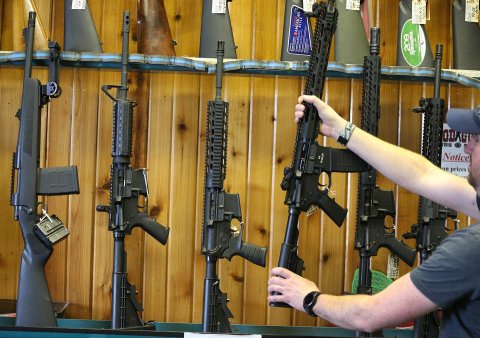
Many Senate Republicans, however, remain unconvinced. "I'm all for practical, common sense solutions [to reduce mass shootings]," Oklahoma Senator Jim Inhofe has said. "I just haven't heard any yet."
Until that moment in 2012 when her son was murdered, McBath says she didn't consider herself a particularly "political person." She had been interested in politics for a while—and had once interned for Douglas Wilder, who became the first African-American governor of Virginia—but she didn't see a career there. She became a flight attendant for Delta Air Lines and moved to Atlanta, where the company is based. "For years, I didn't give politics much thought," she says. McBath explains she always considered herself a gun control advocate but didn't dive deep into the issue.
That changed on Black Friday in 2012, the day Jordan was killed while sitting in a car at a Jacksonville, Florida, gas station. (McBath and her husband had divorced, and Jordan had moved in with his father.) Out of her grief came anger and a need to channel it. "I pretty quickly decided that what matters is what you do with a moment like that," she says. "Do you curl up and fade away, defined only by your grief? Or do you do something about it, try to turn it into something meaningful, not just for you but for many?"
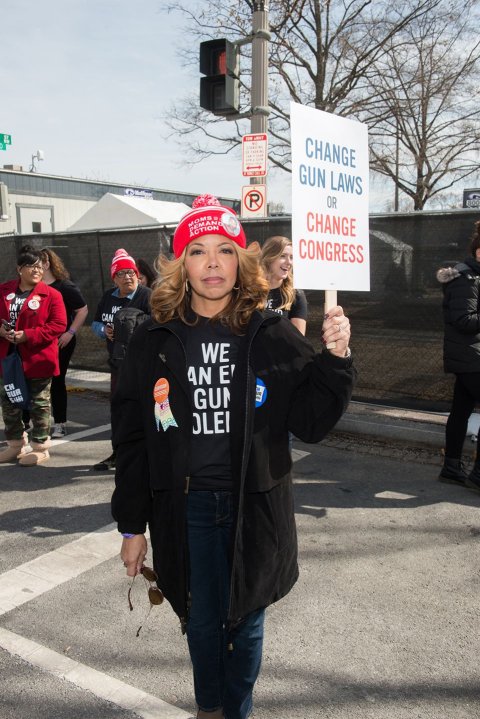
She joined Moms Demand Action, an offshoot of Bloomberg's PAC. She was invited to the White House to hear Obama give a speech on gun violence. She became a prominent member of Mothers of the Movement (a group of African-American women whose children have been killed by the police or gun violence), appearing more and more frequently on TV and testifying against "stand your ground" laws before the Georgia, Florida and Nevada legislatures. She became such a poised and effective communicator that Hillary Clinton's campaign gave her a speaking slot at the 2016 Democratic National Convention. Though motivated by grief, McBath is not overwhelmed by it. "She's calm and convivial—that's who she is," says Ambler, the executive director of Giffords PAC.
Now, politics had become very much part of her. Prominent Democrats in Georgia, including Representative John Lewis of Atlanta, encouraged her to consider running for elected office. She says it was a meeting in 2017 with a member of the Georgia Legislature, Renitta Shannon, that persuaded her. "She told me she thought I could be effective on the inside," McBath says, "to go from talking about common sense gun laws to actually passing them."
The original plan was to run for the Georgia House of Representatives in a safely Democratic district. Then came Parkland, one of the deadliest school shootings in U.S. history, surpassing the infamous Columbine massacre of 1999. "If I'm going to do something in politics on this issue," McBath told herself, "it needs to be in Washington, at the federal level."
On March 8, 2018, she announced she would run against Republican incumbent Karen Handel in Georgia's 6th Congressional District. Although McBath's website noted that she backed the "2nd Amendment rights of Georgians," she also vowed to push for tougher gun laws and challenge the pro-NRA incumbent to justify her past views. "I could never understand how [gun rights supporters] reacted to these [mass shooting] events. They seemed to have a script, offering thoughts and prayers, calling for more stress on mental health issues—which I support, by the way—but it seemed too pat. I was going to make the case for more action."
She won the Democratic primary handily and then beat Handel narrowly, becoming the first Democrat to win a seat once held by former House Speaker Newt Gingrich since the district was redrawn in 1993.
Up and down ballots across the country that night, advocates for gun safety, backed by organizations like Moms Demand Action, won races in very unexpected places. In North Carolina, Natasha Marcus, who used to just send letters to her state senator pleading for more sensible gun laws, clinched a General Assembly seat north of Charlotte. In Arkansas, Nicole Clowney also won a place in her state legislature, running in opposition to a state law allowing guns on college campuses.
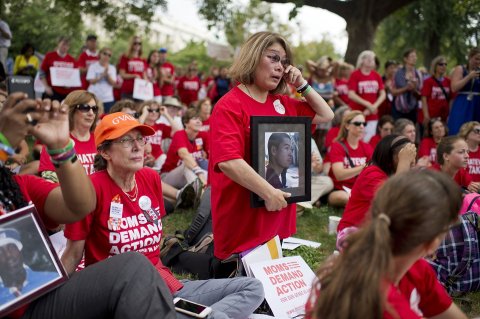
Gun safety groups outspent the NRA, Moms Demand Action's Watts says, "but we outhustled them too." Her group helped register 100,000 new voters. And in 43 races where the NRA endorsed candidates, "we won 33 of them." The "enthusiasm gap on the gun issue has flipped," she says. Exit polls showed gun safety voters now outnumbering those who oppose gun control two to one overall.
On a recent Wednesday during the government shutdown, McBath huddled in a cramped congressional office with two other newly elected Democrats who had campaigned against gun violence: Schrier, the doctor from Washington's 8th District, just east of Seattle; and Jason Crow, an Army Ranger and gun owner who had won a traditionally Republican seat in suburban Denver. They and others have already formed an informal caucus, meeting for occasional cups of coffee or quick lunches. Deeply interested in gun policy, they say the expanded background check bill is just the beginning.
All want to eliminate an obscure measure called the Dickey Amendment—a classic piece of NRA-backed legislation passed in 1996. Three years earlier, the Centers for Disease Control and Prevention (CDC) did a study that came to an obvious conclusion: Guns in the home were associated with an increased risk of homicide in the home. The NRA didn't like that conclusion, and when Republicans took control of the House in the 1994 midterms, the gun lobby went to work. It persuaded Congress to pass the amendment, which states "none of the funds made available for injury prevention and control at the Centers for Disease Control and Prevention (CDC) may be used to advocate or promote gun control." Which effectively meant any research that could conceivably lead to gun control measures could threaten CDC funding.
In the real world, gun policy experts say, that matters. Take, for example, the issue of underground gun markets, where neither buyer nor seller has any interest in being known to authorities and which play a critical role in getting guns into the hands of criminals. Says Daniel Webster, director of the center for gun policy research at Johns Hopkins University, "There's scant research on underground gun markets and how those underground markets differ in places where gun laws are relatively strict versus places with pretty lax laws," a fact he attributes to Congress "bottling up" data in response to pressure from the NRA. Democrats in 2015 tried and failed to revoke the Dickey Amendment.
McBath and her newly elected gun safety proponents vow to change that. "You can't have the gun lobby effectively preventing research funds from flowing to one of the most important domestic issues in the country," Crow says. "We're convinced most sane people will agree with us." And they believe they have a powerful ally: House Speaker Pelosi, who, in an interview with Newsweek, vowed "swift action" in the new Congress. "What [McBath] and so many others have gone through is unthinkable, and we have a responsibility to act," Pelosi says.
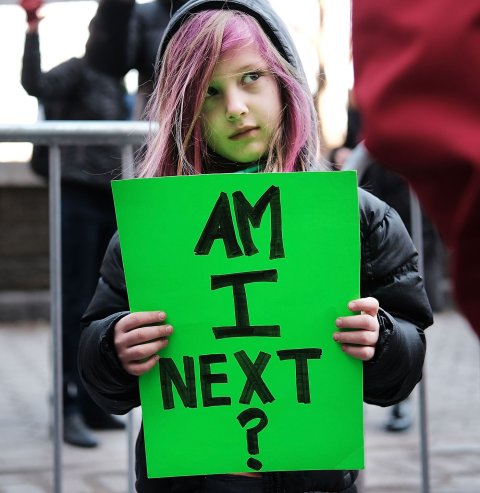
Democrats are also looking into legislation that would expand the universe of "high risk" individuals disqualified from legally buying guns—that is, those who have been convicted of misdemeanors as adults or felonies as juveniles. As Webster—who has been informally advising McBath and several other incoming freshmen—puts it, "Some may assume that persons convicted of misdemeanor crimes do not pose a significant threat for committing serious violent crimes, but that's not right. Many suspects charged with felony crimes are convicted of lesser charges as a result of a plea agreement." He says research shows that those convicted of misdemeanors—including domestic violence—who were legally able to purchase handguns committed crimes following those purchases at a rate two to 10 times higher than that of handgun purchasers with no prior convictions.
They are likely also to revive the proposal requiring permits issued by law enforcement authorities before a gun can be bought. The idea is simple: Just as driving legally requires a license—and a test to demonstrate a basic competence behind the wheel—so should gun ownership. Various states over the years have implemented some form of "permit to purchase" laws, and the results have been clear. As McBath says, "They work. That's what matters."
Advocates point to Missouri, where the repeal of a PTP law in 2007 was followed by a 14 percent increase in the state's murder rate and a 16 percent increase in the state's suicide by firearms rate.
McBath believes her influence—and that of her fellow incoming freshmen who campaigned against gun violence—will come from a focus on facts. "I think there may be a presumption that I'm all about emotion, about anger," McBath says. "That's not accurate." She says in discussions she's had with other incoming freshmen, including Crow (a gun owner), their focus has been on what can realistically be achieved and how they can influence the national debate over guns. Hence the narrow frame of the background checks bill, which does not include more contentious proposals, like banning assault weapons and high-capacity magazines. "My colleagues and I believe clear-eyed discussions about gun violence can move policy in the right direction," McBath says. "We're not 'gun grabbers.' We're not out to demonize gun owners."
In her early days in Washington, McBath has made it a point to say she intends to work with Republicans on gun issues, including those who in the past have been steadfast defenders of the Second Amendment. She notes that among the co-sponsors of the background checks bill is New York Republican Peter King, as well as several other moderate members of the GOP. "My hope is that there is more common ground here than people think," McBath says.
Her supporters believe she possesses something more powerful than righteous anger. "The simple fact is, she's got moral authority," says Ambler. Shortly after McBath won her race last November, 12 people were shot dead in a bar in Thousand Oaks, California. McBath issued a statement. "It is unfortunately not surprising that on the very same day I officially became a Congresswoman-elect," she wrote, "other families in the country are receiving the exact same call I did six years ago, when I learned that my son had been murdered." Says Ambler, "Everyone knows who she is and what she's been through. She's going to be formidable."
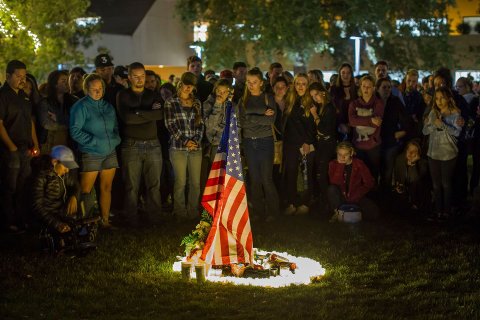
But for all the gun safety movement's current optimism, the fact in Washington remains that the GOP still controls the Senate, having increased its majority last November, and the NRA vows to fight against anything that it believes infringes on the Second Amendment. And even though gun safety advocates have notched a series of victories on the state level—eight states plus the District of Columbia have expanded background check requirements in the past four years, according to Bloomberg's Everytown PAC—they worry about the prospect of potential Supreme Court decisions that could water down some of the more restrictive local measures now on the books. They viewed with alarm the court's recent announcement that it would hear a case challenging a New York City law that restricts a gun owner's ability to transport a weapon outside of the home—even to a second home outside the city or a gun range. Gun rights advocates are hopeful that with two new Trump appointees on the court, its conservative bloc will strike down the New York law.
This, McBath says, is why politics matter. And she and the gun safety coalition in the House—Representative Thompson's Gun Violence Prevention Task Force has expanded from 148 members a year ago to 172 now—understand the limits. They see the electoral gains they made in 2018 as just the start, aiming to set the table for 2020, when Democrats will seek to oust Trump from the White House and some swing-state Republicans from the Senate, like Cory Gardner of Colorado. "If Republicans are seen blocking common sense stuff like the background check bill," says Ambler, "they will pay an even bigger price in 2020."
McBath agrees. "This issue—gun safety—is no longer a strictly partisan one," she says. "That was the lesson of last [November]. Progress may be slow, it may be incremental, but that's OK. I believe time is now on our side, and I'm not going anywhere."
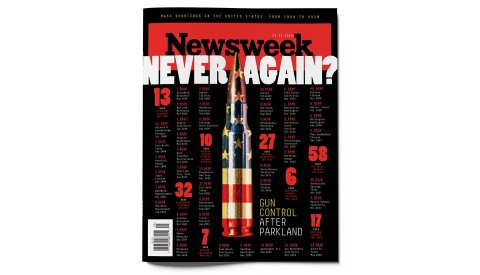
Correction: An earlier version of this story mistakenly said that Everytown for Gun Safety endorsed 66 candidates in the 2018 midterms and 66 percent of them won. The article has been updated to reflect that Everytown went head-to-head with the NRA in 43 federal races and 77 percent of its candidates won.



